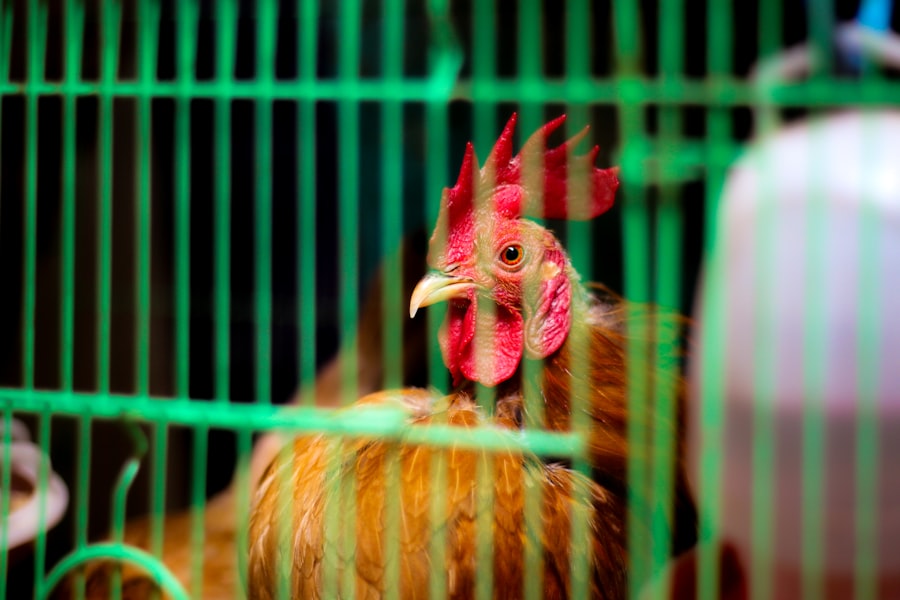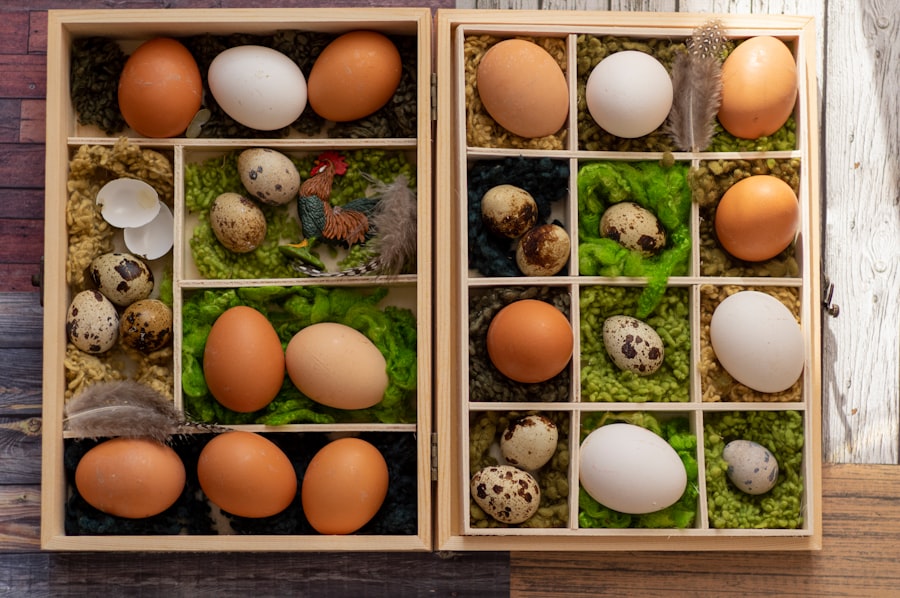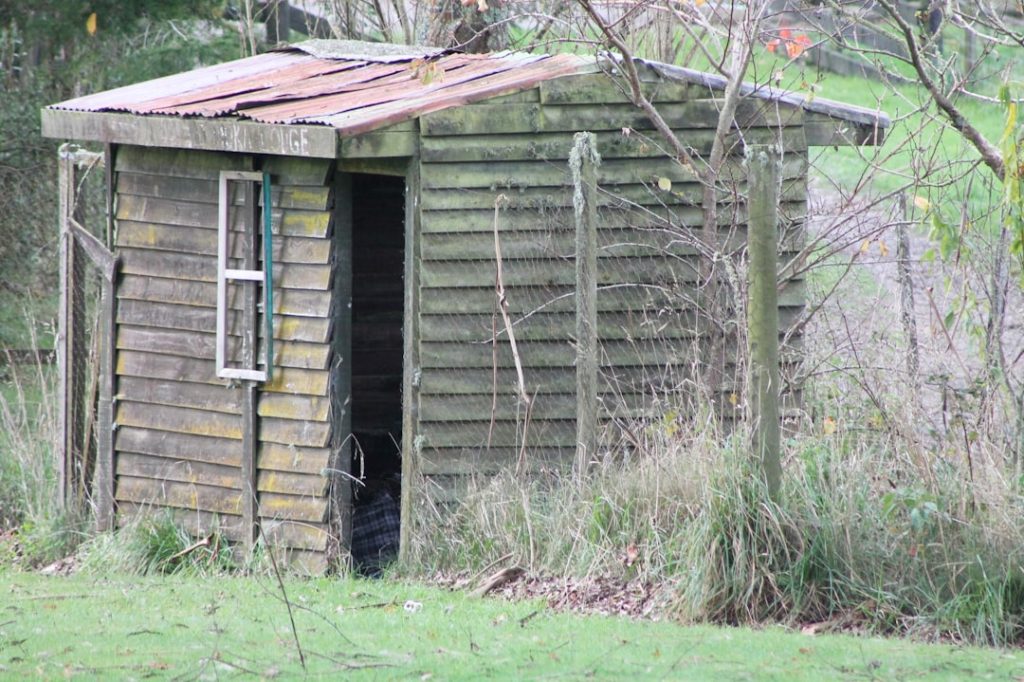Maintaining a clean environment for backyard chickens is essential for their health and well-being. Proper hygiene prevents the spread of diseases and parasites within the flock. A clean coop and surrounding area contribute to the chickens’ mental and physical health, as they thrive in sanitary and comfortable conditions.
Clean living spaces can also improve egg production and overall flock productivity. Cleanliness is crucial for the safety of both chickens and their caretakers. A well-maintained coop reduces the risk of accidents and injuries, such as slipping on wet or soiled bedding, which can result in broken eggs or harm to the chickens.
It also minimizes the attraction of predators and pests to the area. Maintaining a clean backyard chicken coop is vital for the health, safety, and productivity of the flock.
Table of Contents
Key Takeaways
- Cleanliness is crucial for the health and well-being of backyard chickens
- Regular cleaning and maintenance of the coop is essential to prevent disease and parasites
- Proper waste management is important to keep the coop and surrounding area clean and odor-free
- Providing dust baths for chickens helps them maintain good hygiene and control parasites
- Maintaining clean feeding and watering stations is vital for the health of the chickens and to prevent contamination
- Monitoring and managing pest infestations is necessary to protect the chickens from diseases and discomfort
- Keeping the surrounding area clean helps to prevent the spread of diseases and maintains a healthy environment for the chickens
Regular Cleaning and Maintenance of the Coop
Daily Cleaning Tasks
Daily cleaning tasks should focus on removing soiled bedding, droppings, and any leftover food from the coop. This helps maintain a dry and well-ventilated environment, reducing the risk of moisture buildup and subsequent bacterial and fungal growth.
Regular Inspections and Deep Cleaning
Regular inspections of the coop are vital for ensuring its structural integrity. Look for signs of damage or wear and tear, and perform deep cleaning every few weeks or as needed. Deep cleaning involves removing all bedding, scrubbing surfaces with a mild detergent, and disinfecting with a poultry-safe disinfectant.
Maintaining Nesting Boxes and Overall Coop Hygiene
Regularly check and clean nesting boxes to ensure they are free from debris and pests. By maintaining a clean and well-maintained coop, backyard chicken owners can provide a safe and comfortable living space for their flock.
Proper Waste Management

Proper waste management is essential for maintaining cleanliness in the backyard chicken coop. This includes managing both solid waste, such as droppings and bedding, as well as liquid waste from waterers. Utilizing a deep litter method can help manage solid waste by allowing it to compost naturally within the coop.
Regularly turning and adding fresh bedding to the deep litter can help control odors and break down waste more effectively. For liquid waste, it is important to regularly clean and refill waterers to prevent the buildup of algae and bacteria. Using nipple waterers or other clean water dispensers can help minimize spillage and contamination.
Additionally, positioning waterers in a way that prevents them from getting soiled by droppings can help maintain a cleaner environment. Proper waste management not only contributes to cleanliness but also supports environmental sustainability by utilizing waste as compost for gardens or other purposes.
Providing Dust Baths for Chickens
Chickens naturally engage in dust bathing behavior to maintain their hygiene and health. Providing a designated dust bathing area in the coop or run is essential for allowing chickens to engage in this natural behavior. Dust bathing helps chickens control parasites and excess oils on their feathers, promoting healthier plumage and skin.
It also serves as a form of entertainment and stress relief for the flock. To create a dust bathing area, simply provide a shallow container filled with fine sand or dusting material such as diatomaceous earth. Placing the dust bath in a dry and shaded area will encourage chickens to use it regularly.
It is important to regularly replenish the dusting material and keep the area clean to ensure its effectiveness in promoting cleanliness among the flock. By providing dust baths, backyard chicken owners can support their chickens’ natural behaviors while contributing to their overall cleanliness and well-being.
Maintaining Clean Feeding and Watering Stations
Clean feeding and watering stations are essential for promoting cleanliness and preventing disease among backyard chickens. Regularly cleaning feeders and waterers helps prevent the buildup of mold, bacteria, and other contaminants that can negatively impact the health of the flock. It is important to use feeders and waterers that are easy to clean and sanitize to ensure proper maintenance.
Additionally, positioning feeding and watering stations in a way that prevents contamination from droppings or bedding is crucial for maintaining cleanliness. Elevating feeders and waterers off the ground or using hanging options can help minimize soiling and spillage. Providing ample space for all chickens to access feed and water simultaneously can also reduce competition and potential messes.
By maintaining clean feeding and watering stations, backyard chicken owners can support the health and cleanliness of their flock.
Monitoring and Managing Pest Infestations

The Risks of Pest Infestations
Pest infestations can pose a significant threat to the cleanliness and health of backyard chickens. Common pests such as mites, lice, flies, and rodents can spread diseases, cause discomfort, and negatively impact egg production.
Early Detection and Management
Regular monitoring of the coop and surrounding area for signs of pests is essential for early detection and management.
Pest Control Measures
Implementing pest control measures such as regular cleaning, using natural deterrents, and employing integrated pest management strategies can help prevent infestations. This may include regularly cleaning bedding, using diatomaceous earth or herbal pest repellents, sealing entry points, and employing traps or predators for pest control.
Maintaining a Clean and Healthy Environment
By actively monitoring and managing pest infestations, backyard chicken owners can maintain a clean and healthy environment for their flock.
Tips for Keeping the Surrounding Area Clean
In addition to maintaining a clean coop, it is important to keep the surrounding area clean to promote overall hygiene and safety for backyard chickens. This includes regularly removing any debris, such as fallen branches or leaves, that can attract pests or create hazards for the flock. Keeping grass trimmed and vegetation managed can also help reduce hiding spots for pests and predators.
Properly managing compost piles or waste disposal areas is crucial for preventing odors, attracting pests, and maintaining a clean environment. Utilizing compost bins with secure lids or regularly turning compost piles can help control odors and prevent pest infestations. Additionally, practicing good sanitation habits such as washing hands before and after handling chickens or their supplies can help prevent the spread of diseases.
Overall, maintaining cleanliness in both the coop and surrounding area is essential for promoting the health, safety, and well-being of backyard chickens. By implementing regular cleaning routines, proper waste management, providing dust baths, maintaining clean feeding and watering stations, managing pest infestations, and keeping the surrounding area clean, backyard chicken owners can create a healthy environment for their flock to thrive.
If you’re looking for tips on how to keep your backyard chicken coop clean, you may also be interested in learning about the importance of proper ventilation in chicken coops. Check out this article on poultrywizard.com for helpful information on maintaining a healthy environment for your feathered friends.
FAQs
What are some tips for keeping backyard chickens clean?
Some tips for keeping backyard chickens clean include regularly cleaning the coop, providing proper ventilation, using absorbent bedding, and maintaining a dry and well-drained outdoor area for the chickens to roam.
How often should the chicken coop be cleaned?
The chicken coop should be cleaned regularly, with a thorough cleaning at least once a week. This includes removing soiled bedding, scrubbing surfaces, and disinfecting to prevent the buildup of bacteria and pests.
What type of bedding is best for keeping chickens clean?
A good bedding option for keeping chickens clean is pine shavings or straw, as they are absorbent and help control odors. Avoid using cedar shavings, as they can be toxic to chickens.
How can proper ventilation help keep chickens clean?
Proper ventilation in the chicken coop helps to reduce moisture and ammonia buildup, which can lead to dirty and unhealthy conditions for the chickens. Good airflow also helps to keep the coop dry and free from mold and mildew.
What are some ways to keep the outdoor area clean for chickens?
To keep the outdoor area clean for chickens, regularly rake and remove droppings, provide dust bathing areas, and ensure the area is well-drained to prevent mud and standing water. This helps to minimize the spread of bacteria and parasites.
Meet Walter, the feathered-friend fanatic of Florida! Nestled in the sunshine state, Walter struts through life with his feathered companions, clucking his way to happiness. With a coop that’s fancier than a five-star hotel, he’s the Don Juan of the chicken world. When he’s not teaching his hens to do the cha-cha, you’ll find him in a heated debate with his prized rooster, Sir Clucks-a-Lot. Walter’s poultry passion is no yolk; he’s the sunny-side-up guy you never knew you needed in your flock of friends!







